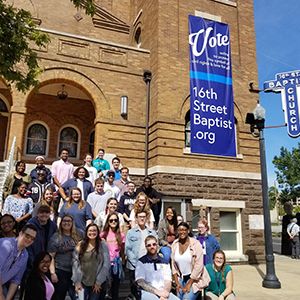Birmingham. Selma. Montgomery.
Synonymous with the American Civil Rights Movement, these Alabama cities weathered peaceful protests, acts of civil disobedience, and violent clashes over racial discrimination in the 1950s and 1960s.
From the Montgomery Bus Boycott to the Birmingham Children’s Crusade and protest marches from Selma to Montgomery, these cities were among those at the forefront of America’s decades-long quest for equal rights.

In 1963, the 16th Street Baptist Church was the target of a racially motivated bombing that killed four young girls and injured 22. The next year, President Johnson passed the 1964 Civil Rights Act, which was followed by the 1965 Voting Rights Act. Marian University students visited the church and other sites along Birmingham's Civil Rights Heritage Trail during the trip.
This October, Marian University students and faculty headed south to experience these historic places for themselves—and explore issues that still haunt the nation today.
Over five days and four nights, 32 students and two faculty members traveled the Yellowhammer State. Learning about the history of race relations in the region, the group visited multiple sites including:
- 16th Street Baptist Church
- Birmingham Civil Rights Institute
- Civil Rights Memorial Center
- Ebenezer Missionary Baptist Church
- Edmond Pettus Bridge
- Kelly Ingram Park
- National Voting Rights Museum
- The Legacy Museum
- The National Memorial for Peace and Justice
Throughout the trip, they reflected on the nation’s past and its future, considering human equality and civil rights through the lens of Marian University’s core Franciscan values, including peace and justice, dignity of the individual, and reconciliation.
Nearly half of the group was composed of freshmen. Along with two international exchange students, the rest of the group included sophomores, juniors, and seniors. Many are secondary education and history majors, although political science, sociology, psychology, biology, public health, nursing, and students from other majors were also represented.
The trip was connected to an earlier October 2 guest lecture by James Madison, a professor emeritus of history at Indiana University and author of A Lynching in the Heartland: Race and Memory in America.
Madison’s 2003 book refutes the notion that lynching was confined to the southern states. In it, he details the 1930 lynching in Marion, Indiana of two black teens accused of the murder of a young white man and the rape of his white girlfriend.
A mob dragged the two young men from the Grant County Jail to the Courthouse Square where they threw the hanging ropes over the limb of a maple tree. The crime was witnessed by an estimated crowd of about 4,000 Hoosiers. No one was ever punished for the murders.
"Many students were shocked to learn that one of the most infamous American lynchings took place less than a two-hour drive from our campus,” said Dr. Adrianna Ernstberger, assistant professor of history and director of gender studies in the Department of History and Social Sciences at Marian. “Madison’s lecture was powerful. It reminded us that the perpetuation of white supremacy is not just a southern problem.”
Joined by Dr. Wesley Bishop, a visiting professor of history at Marian, Ernstberger led students to significant museums, memorials, and public spaces in Alabama.
“Our goal was to give students a solid understanding of civil rights history in America and help them apply what they learn to contemporary issues of social injustice. As historians, we believe that our nation must understand where we’ve been in order to create new strategies for where we want to go,” Ernstberger explained.
Among the key takeaways for students:
- The Civil Rights Movement isn’t confined to the 1960s. The struggle to end racism in America began long before then and continues today.
- The movement may have been led by noted figures like Dr. Martin Luther King, Jr., Rosa Parks, and John Lewis, but it was and continues to be sustained by millions of American people who join marches, protests, boycotts, sit-ins, and who are politically active.
- Americans can act to protect civil rights and eliminate social inequality. Students, citizens, and community organizers can build and mobilize social justice movements that make an impact, like the Black Lives Matter Movement.
Thanks to broad support and financial assistance from key campus supporters, the cost of the trip for students was just $250, which included all meals, hotels, museum admissions, and travel expenses.
For more information about bachelor's degree programs offered by the Department of History and Social Sciences, contact the Office of Undergraduate Admission at admissions@marian.edu or 317.955.6300.